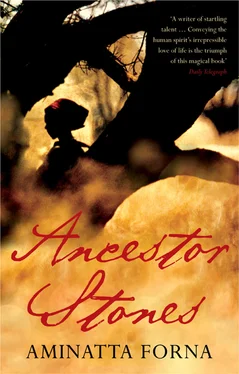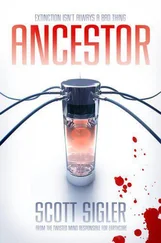But that was not the reason we all looked forward to the festival. In our house my father presented each of his wives with a costume specially for the day. The new clothes were delivered the evening before, ready for the last day of the fast.
That year my mother spent the whole of the day preparing herself. Finda worked on her hair for all of the morning: plaits so fine it was as though each comprised of no more than six hairs. These she wove, three by three, into thicker braids and then again, until my mother’s head was covered in shining coils decorated here and there with tiny pale cowrie shells. In the afternoon she sat for two hours with the ends of her fingers resting in bowls of lali until the tips turned red. She sent me out to pick a new loofah from the vine, and I found a fine one. On the way home I held it close to my ear and shook it, listening to the sound the seeds made, like trickling water. Afterwards I emptied out the seeds and carried it to my mother. In her bedroom I rubbed her back and her arms with it, smoothed her with shea butter until her skin glowed deeply as a garden egg.
We were on the front balcony watching the darkness, watching for my father’s gifts to his wives to be delivered. Ibrahim and Idrissa pretended not to be interested. They were throwing the eyeless husk of a lizard at each other: dodging and ducking, laughing in their newly deep voices, forgetting that they were men. Our own garments were inside, finished by the tailor in the weeks before. I had picked out the cloth with my mother at the Fula shop. We watched as my father’s retainer came out from his room. We smothered our laughter as Ibrahim walked on the outside edges of his feet and made his legs bow and tremble, bending like the old man under the weight of the packages. We followed the retainer with our eyes as he passed through the compound, visiting one house and then the next.
Our mother did not come out. Instead I carried the package to her.
‘Open it, mama!’ I cried.
She was sitting on the edge of her bed, shoulders hunched, feet on the floor pointing straight ahead. She looked as though she had been sleeping. I did a little jig. My mother didn’t even turn to look. She seemed bored by my playful ways. The light on her skin gave a dull cast, for a moment it seemed to me she was old. She was sitting with her hands across her stomach. The air rustled in her chest like dried leaves.
‘It’s late now. In the morning you’ll see it. Now it’s time to sleep.’
But it wasn’t time to sleep. The village was still awake. Out back, Finda was preparing the last of the dishes for the celebrations the next evening. My brain was whirling with excitement.
‘But I want to see it now. Let me see it.’ I made my voice into a whine, but with a threat. Like the noise a mosquito makes. My mother lay back and turned over, pulling the cover over her shoulders.
‘Tomorrow,’ she repeated. She twisted herself around to look at me over her shoulder, smiled at me in a way that made me feel less bad. ‘Send Finda for me.’
In the morning the air was cold and smelled of dust. I washed and slipped my new dress over my head. It was too long, but I had a year to grow into it. The cloth was shiny and stiff, not worn soft like my everyday clothes. I ran to find my mother.
That moment when I opened the door: in the dream, I see her again. She is wearing her new gown, standing before the opaque light spreading through the shutters behind her. Only, in the dream we are not in the old place, but in the bedroom of the house I lived in with my husband after I was married. Everything is as it was when I lived there as a young wife, even the heavy, woven bedspread we were given as a wedding gift and the animal skins on the floor that my husband brought back from the place where he worked.
And in the dream I am thinking, how can I be married already if this is my mother, so young?
Nothing had prepared me that morning for the sight of her in that dress. Along dress, made of printed cloth from Europe, embroidered with yellow and blue thread across her breast. Sleeves that billowed out and narrowed into cuffs fastened with real buttons. When she walked the pleated skirt brushed the floor. In those days the women wore simple tunics and on special days, like when it was somebody’s forty days, maybe an embroidered gown or a long skirt and tamule with sleeves that stopped at the elbow. I had never seen a dress such as this.
That day we bluffed better than anybody, walked in front of them all into the mosque. I felt the envy in their glances. I held my head so high. When we sat down at the back I could see my brothers in their new bubas practically under the alpha’s nose. My father was at the front wearing an agbada of pure white, with a red sash over his shoulder. At the back we didn’t pay much attention to the sermon; the women gossiped among each other. All talk that day was of each woman’s outfit. From the outset I knew my mother’s dress made the greatest impression of all. My mother was the very first to wear the new style like the Creole women in the big city.
That day! The best day of my life. The day every one of my father’s wives wished she was my mother. And every one of his daughters wanted to be me. I had no fears. No cares. I did not see how life could get any better. But then my luck changed like the wind. And my life turned around completely.
* * *
There were so many of us — children of my father. And yet I had few friends among my brothers and sisters when I was growing up, only Idrissa and Ibrahim who were my belly brothers. Mariama and her sisters were gone. Ya Janeba and Ya Sallay’s children kept to themselves: like their mothers they appeared not to welcome outsiders. My brothers, too, preferred their own company or that of the other young men around. And although they sometimes came and boasted to me of their exploits, we spent less and less time together.
Finda was my friend. I followed her as she went about her chores. When my brothers and I fought I ran to hide behind her. And it was she I asked the things I didn’t understand, when Idrissa and Ibrahim sniggered into cupped hands but refused to tell me what was funny. Finda didn’t tell me either, but she scolded them and that was good.
It was Finda I turned to when I noticed my mother growing taller.
I’ve told you my mother was a tall woman. And so she was. Only those days, every time I looked at her, she seemed higher than ever. Though my father was always telling me I had grown, I even began to imagine I was shrinking. I measured myself, scratching a mark on the outside wall of the house with a stick. One afternoon we were trapped by the rain, watching it fall out of the sky like sheets of glass, distorting the shapes of the houses and trees beyond, turning the ground into miniature rapids of red mud. I was helping Finda to husk groundnuts, breaking open the soft, steaming shells and peeling the thin membrane from each of the nuts.
Finda set down her pan and told me my mother was sick.
I didn’t know what she meant. I asked the only question I could think of: ‘Why would that make her taller?’
‘Your mother isn’t taller. That’s just the way it looks.’
A wasting illness had stolen her appetite. And as her body drew in so it seemed to lengthen.
‘When will she be better?’
‘Soon. God willing.’
‘Tomorrow?’
‘Maybe not.’
‘Next tomorrow then?’
‘Soon. God willing.’
The weeks rolled past, my mother took to her bed. The house was quiet. My brothers were out all day. I sat at home and waited for my mother to get well again. Sometimes I went to her room and sat with her. The room smelled of un-aired clothing, sweat and something rotten. My mother was a black woman, but out of the sun her skin yellowed like a dried tobacco leaf. I tried to keep her company, to tell her the things that occupied my day but she seemed not to listen because too often she would laugh suddenly in the wrong place or ask a question that had nothing to do with the thing I was saying.
Читать дальше












